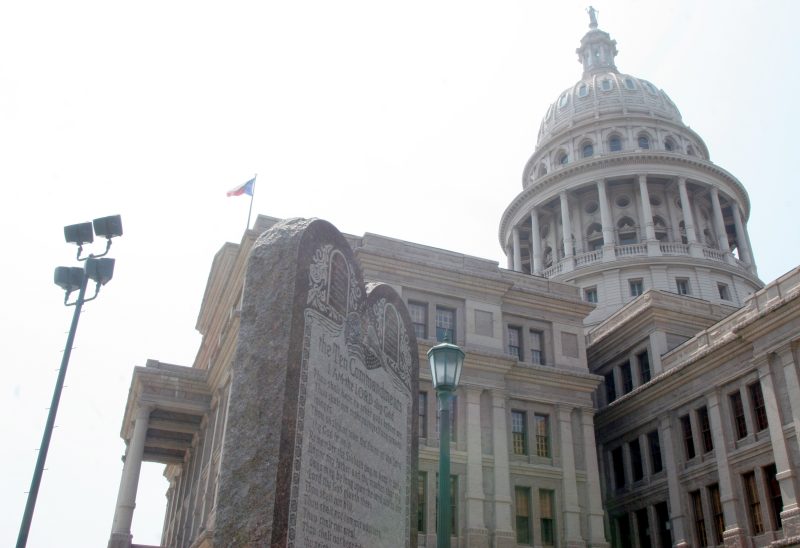Thou shalt have the Ten Commandments in Texas public schools?
The Republican-controlled Texas Senate passed three bills on Thursday that would require public schools to promote religion to their students and employees, including a proposal for each classroom in the state to prominently display the Ten Commandments, starting next year.
Senate Bill 1515 says “a public elementary or secondary school shall display in a conspicuous place in each classroom of the school a durable poster or framed copy of the Ten Commandments.” The bill sponsored by state Sen. Phil King (R), which passed by a 17-12 vote, says the document must be at least 16 inches tall by 20 inches wide “in a size and typeface that is legible to a person with average vision from anywhere in the classroom in which the poster or framed copy is displayed.”
The Ten Commandments bill will head to the state House for consideration. If the Republican-led Texas House approves the bill and Gov. Greg Abbott (R) signs it into law, the measure would go into effect Sept. 1, the start of the 2023-24 academic year.
The Ten Commandments are a set of biblical principles related to worship and ethics on a range of topics, including killing, adultery and stealing, that are crucial to Christianity and Judaism.
The bill comes less than a year after the U.S. Supreme Court ruled that a school board in Washington state discriminated against a former football coach when it disciplined him for postgame prayers at midfield. The high court ruled in June that Joe Kennedy was praying as a private citizen, not a school district employee.
In a committee hearing this month, King cited the Supreme Court’s 6-3 decision in Kennedy v. Bremerton School District as to why the path was clear to bring the Ten Commandments back into Texas classrooms. He has described Ten Commandments as being part of American heritage.
“[The bill] will remind students all across Texas of the importance of the fundamental foundation of America,” King said during the hearing, according to the Texas Tribune.
In the same session Thursday, the Texas Senate gave final passage to a bill that would allow public schools to require time for students to pray and read the Bible at school. Senate Bill 1396 from state Sen. Mayes Middleton (R) also passed by a vote of 17-12.
Another proposal that was passed, Senate Bill 1556 by state Sen. Tan Parker (R), would codify the Supreme Court’s ruling on Kennedy into law and protect the right of school employees to engage in religious speech or prayer while on duty. That bill passed on a 26-5 vote.
King and Parker did not immediately respond to requests for comment Friday morning. Middleton told The Post in a statement that both the passage of his bill for prayer in public schools and the Kennedy case shows that courts have “debunked the false doctrine of separation of church and state.”
“Our founders certainly never intended separation of God from government or schools, despite the left’s attempts to mislead people on this fact,” Middleton said. He added, “This bill allows that and the free exercise of religion in our public schools, as is guaranteed in the Constitution. Our schools are not God-free zones.”
The state Senate’s passage of bills injecting religion into public schools was celebrated by conservatives, including Texas Lt. Gov. Dan Patrick (R), who said that allowing the Ten Commandments and prayer in public schools was among the ways to prove that Texans “have the right to freely express their sincerely held religious beliefs.”
“I believe that you cannot change the culture of the country until you change the culture of mankind,” Patrick said in a news release. “Bringing the Ten Commandments and prayer back to our public schools will enable our students to become better Texans.”
Critics denounced the Texas Senate passing the bills on religion in public schools. John Litzler, general counsel and director of public policy at the Texas Baptists Christian Life Commission, has opposed the bill, arguing that taxpayer dollars should not be put toward religious texts and that parents, not schools, should be the ones talking to their children about religion.
“I should have the right to introduce my daughter to the concepts of adultery and coveting one’s spouse,” Litzler said during this month’s hearing. “It shouldn’t be one of the first things she learns to read in her kindergarten classroom.”
The ACLU of Texas called the bill an “example of failed priorities and failed leadership.”
“The U.S. Constitution expressly prohibits the entanglement of church and state, and the Texas Constitution guarantees the freedom of worship,” David Donatti, an attorney for the ACLU of Texas, told The Washington Post. “Whether we choose to belong to one religion or none at all, people of all faiths and creeds should together resist the state’s endorsement of one particular religion.”
The Texas bills are among the wave of proposed legislation in states with Republican-controlled legislatures that are reshaping how schools discuss gender, diversity and religion.
Republican lawmakers such as Rep. Lauren Boebert (Colo.) have said they are “tired” of the separation of church and state, a long-standing concept in the U.S. Constitution. The First Amendment, which states that “Congress shall make no law respecting an establishment of religion, or prohibiting the free exercise thereof,” has been widely interpreted to mean the separation of church and state — although the phrase is not explicitly used.
Much of the focus on religion in public schools has come in the months after the Supreme Court’s conservative justices voted in his favor. Justice Neil M. Gorsuch wrote for the fellow conservative majority in the decision, saying Kennedy’s prayers were protected by the Constitution’s guarantees of free speech and religious exercise.
“Respect for religious expressions is indispensable to life in a free and diverse Republic — whether those expressions take place in a sanctuary or on a field, and whether they manifest through the spoken word or a bowed head,” Gorsuch wrote.
The bills are part of a larger discussion in Texas at the intersection of religion and education. Abbott has pushed for what he’s described as “education freedom” as part of his efforts to promote a bill to create education savings accounts. Abbott has pitched the program to send public dollars to private schools at Christian campuses, which could benefit the most from the initiative, according to the Dallas Morning News.
The debate over displaying the Ten Commandments in public places has gone on for decades. Georgia, Indiana, Louisiana, Mississippi, Oklahoma, South Dakota and Tennessee are among the states with laws that allow the Ten Commandments to be displayed in an official capacity, according to the Anti-Defamation League. A monument of the Ten Commandments has been on display in front of the Texas Capitol in Austin since 1961, according to the Texas State Preservation Board.
Although the Supreme Court ruled in the 1980 case of Stone v. Graham that Kentucky’s statute requiring the posting of the Ten Commandments in public school rooms “has no secular legislative purpose, and is therefore unconstitutional,” Texas Republicans have argued that the ruling in the Kennedy case last year is what could bring the Ten Commandments back to public schools.
“Senate Bill 1515 restores a little bit of those liberties that were lost,” King said this month during a hearing with the state Senate Education Committee, according to KXAN, an NBC affiliate in Austin.
When Litzler opposed the Ten Commandments bill during the April 6 hearing, state Sen. Donna Campbell (R) was surprised that a fellow Baptist representing a faith organization was against the proposal.
“I am very surprised and disheartened, and disappointed, that this association says Baptists take offense to having the Ten Commandments in the classroom,” Campbell said. She added, “How can you ask a child to appreciate the moral conscience if they don’t have a chance where to choose their freedom?”
Litzler replied, “We believe this [is the] responsibility of the church and of those faiths to educate children on their religious freedom, not the duty of the state.”
Two weeks later, Campbell was among the Texas state senators to vote yes on the bill.
Robert Barnes and Adela Suliman contributed to this report.



























